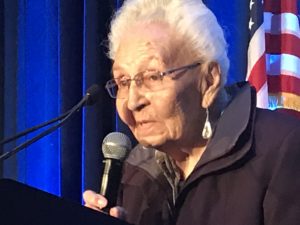During the month of March, in recognition of Women's History Month, Native News Online will feature various Native American women who have contributed to the betterment of Indian Country.

Marcella LeBeau (October 12, 1919 – November 21, 2021)
Marcella Rose LeBeau, a tribal citizen of the Cheyenne River Sioux, lived a long life that was spent in service to others–in Indian Country and beyond–as a nurse, tribal councilor, and advocate.
Born in Promise, South Dakota, her grandmother gave her Native name: Wigmunke’ Waste Win’, which means Pretty Rainbow Woman. She became a nurse in 1942 and one year later, LaBeau enlisted in the Army Nurse Corp, and served as a combat nurse during World War II where she served the the “Greatest Generation” wounded solidiers.
She provided medical care for soldiers injured during the Battle of the Bulge in Normandy, France on D-Day. For her heroic service, LeBeau was honored by the country of France with its highest honor, the French Legion of Honor Medal
Upon receiving a Leadership Award from the National Congress of American Indians (NCAI) during its winter session in Washington, D.C. in February 2020, LeBeau, 100, told a moving story of having treated a soldier, a tribal citizen of the Rosebud Sioux Tribe, who lost both of his legs during the war, and then meeting him some forty years later. He told her then he never forgot the care she provided for him and help restore his will to live.
After World War II, LeBeau returned home to the Cheyenne River Sioux and worked as a nurse and other positions for the Indian Health Service.
She eventually entered tribal politics and served on the Cheyenne River Sioux Tribal Council from 1991 to 1995.
Her advocacy led Lebeau even at 100 years-old to still work to have the medals of honor rescinded of those U.S. Calvary servicemen who participated in the 1890 Wounded Knee Massacre that left close to 300 Lakota men, women and children dead. She was instrumental in getting the Remove the Stain Act introduced in Congress.
During her response at the NCAI 2020 State of the Indian Nations address, then Rep. Deb Haaland (D-NM), mentioned Lebeau.
“It is also a tremendous honor for me to say the name of Marcella LeBeau; a leader who has consistently represented her people with grace and unyielding courage. Ms. LeBeau has served Indian Country, and our country in the Army Nurse Corps during World War II, tending bedside in surgical tents while bombs dropped around Her legacy will be carried forward for generations to come,” Haaland said.
On November 6, 2021, LeBeau was inducted into the Native American Hall of Fame for contributions “to the health and well-being of Lakota people, World War II soldiers, and diverse populations of people.”
LeBeau passed away on November 21, 2021 in Eagle Butte, South Dakota after a brief illness. She was 102.
More Stories Like This
Native News Weekly (August 25, 2024): D.C. BriefsNavajo Nation Mourns the Passing of Former Vice President Rex Lee Jim
Deb Haaland Earns Endorsement From Communications Workers of America Local 7076
University Soccer Standout Leads by Example
Two Native Americans Named to Democratic Congressional Campaign Committee's“Red to Blue” Program
Help us defend tribal sovereignty.
At Native News Online, our mission is rooted in telling the stories that strengthen sovereignty and uplift Indigenous voices — not just at year’s end, but every single day.
Because of your generosity last year, we were able to keep our reporters on the ground in tribal communities, at national gatherings and in the halls of Congress — covering the issues that matter most to Indian Country: sovereignty, culture, education, health and economic opportunity.
That support sustained us through a tough year in 2025. Now, as we look to the year ahead, we need your help right now to ensure warrior journalism remains strong — reporting that defends tribal sovereignty, amplifies Native truth, and holds power accountable.
 The stakes couldn't be higher. Your support keeps Native voices heard, Native stories told and Native sovereignty defended.
The stakes couldn't be higher. Your support keeps Native voices heard, Native stories told and Native sovereignty defended.
Stand with Warrior Journalism today.
Levi Rickert (Potawatomi), Editor & Publisher

